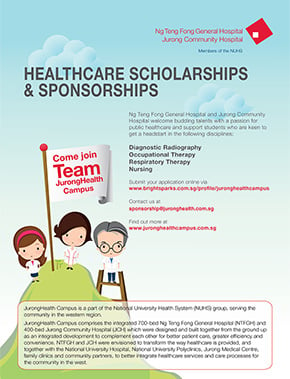Singapore’s rapidly ageing population is putting the pressure on the healthcare landscape. As people live longer, the call has shifted for better management of diseases. It is an important call, and one that requires more than just doctors to respond to.
The need today is also for more allied health professionals like pharmacists. More than just medicine dispensers, pharmacists manage the medical prescriptions each patient is given and ensure medical prescriptions are safe and appropriate. In addition, they provide patients and their caregivers with counselling to understand the possible side effects of each medication and the importance of keeping to the course of medication. All of these are essential in ensuring patients can adhere to their medical routines and improve their health.
We speak to Devester Choo Yun Ming who is currently a pharmacist at the Ng Teng Fong General Hospital. He clarifies the common misconceptions that people have about pharmacists and explains how the career is a dynamic one of diverse opportunities.
What sparked your interest in pharmacy?
Devester Choo Yun Ming: I was watching my late grandmother arrange her chronic medications into pill boxes. I was amazed at how such small pills are able to treat medical illnesses and wanted to learn more. Furthermore, I have always liked to interact with people and help others. I felt that working in the healthcare sector would help me combine these two interests, while serving a higher calling.
What is the biggest misconception about pharmacists?
Devester: People may have the misconception that pharmacists are just stationed at the counters handing out medications, but in reality, pharmacists do much more than that.
Each time a prescription is received, the pharmacist must ensure the instructions from the prescription are translated accurately onto drug labels. Following which, the pharmacist has to review the medication orders to check for appropriateness and safety. If the medication is for a chronic condition, the pharmacist also has to compare the current order with patient’s past medical records and ensure patients are advised of any change in medications.
Sometimes a pharmacist will also handle drug enquires from patients, nurses and doctors. This requires an updated knowledge on different drugs in order to provide the necessary information.
What are some of the other roles a trained pharmacist can pursue?
Devester: After rigorous training, pharmacists can also become qualified to run their own ambulatory clinics, such as heart failure, anticoagulation or smoking cessation clinics. During these clinic sessions, the pharmacist will review their patients’ medical conditions and titrate their medications as needed on the spot.
As a pharmacist, I am also part of the Outpatient Medication Safety Team. I oversee the process of collecting information on medication errors and system failures. This ensures that mistakes are captured and barriers to reporting are properly addressed. From this, I develop and implement error-prevention strategies to improve the safety of our processes.

Devester Choo Yun Ming
Healthcare Scholar
Pharmacist
Ng Teng Fong General Hospital
What qualities do you think a pharmacist needs to have?
Devester: A pharmacist should be patient-centred and a good communicator. Many a time, the pharmacist is the link between the doctor and patient and to other healthcare professionals. As patients may be frustrated with their situation, the pharmacist needs to actively listen to their problems in order to mobilise the necessary parties and recommend the most appropriate solution.
A pharmacist should also have the desire to learn – regardless of seniority. It is impossible for one to acquire complete pharmaceutical knowledge upon completion of a degree in pharmacy. There will be constant developments and changes in drug therapy management, with that being said it is also important to regularly update one’s skills and keep up with the current trends.
Could you share one of your most memorable moments so far?
Devester: It was when I met a codeine addict. The patient reported coughing for the past few days, but did not want to see a doctor due to financial constraints. He insisted on a specific codeine-containing cough syrup that he claimed had been effective in the past, and also declined all other alternatives I had recommended.
I detected something amiss and proceeded to check his medical history. That was when I discovered that he had been collecting the same type of cough syrup from different healthcare institutions regularly over the past few months!
When I rejected his request and advised him to seek medical help instead, he flared up and tried to make me change my mind by passing me a piece of paper, which he thought was his prescription. Instead, it turned out to be a memo from his general practitioner to his psychiatrist stating that he has an addiction to codeine.
I stood my ground despite his verbal abuse, and although he subsequently submitted a complaint letter regarding my “poor service”, I know what I did was right.
Any words of advice for those exploring their scholarship options?
Devester: You should have the passion and the desire for growth in the area of interest before considering the relevant scholarship options. The scholarship which you have selected should provide you with the platform and the opportunities to achieve your future goals and aspirations. It is important to consider carefully and not take up a scholarship for the sake of having a scholarship as it is a long-term commitment.

